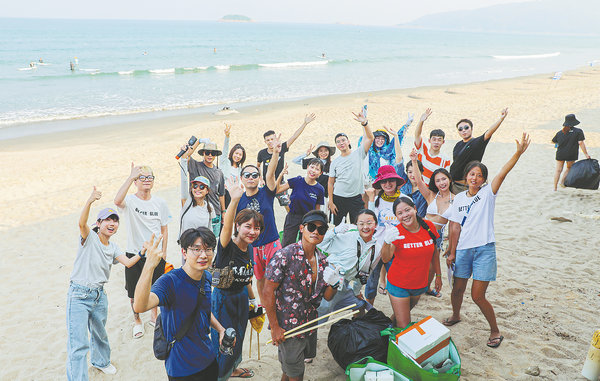Bringing tides of change


A dwarf sperm whale was found stranded on a beach in Sanya, Hainan, in February this year. It was immediately transferred to Haichang Conservation Center for rescue. Wang Miao was part of the team. She was helping hold the whale up straight so it could get an IV with its blowhole above water. But at that moment, it suddenly stopped breathing, and there was nothing she and the team could do to revive it.
The autopsy afterward found a large amount of plastic waste in the whale's stomach, which, according to Wang, kept it from digesting and feeding properly. The whale was also found to be pregnant, making it even weaker, she said.
"Sadly, it wasn't a successful rescue. But it made us face the blunt reality of what plastic waste is doing to marine life," added the 35-year-old diver and founder of the Better Blue NGO.
The United Nations has designated June 8 of every year as World Oceans Day to raise awareness of ocean protection.
"With 90 percent of big fish populations depleted, and 50 percent of coral reefs destroyed, we are taking more from the ocean than can be replenished," writes the UN on its website. "We need to work together to create a new balance with the ocean that no longer depletes its bounty but instead restores its vibrancy and brings it new life."
With the same purpose in mind, Wang founded Better Blue in 2017.
As of December 2022, the organization has recruited 1,011 volunteers from over 20 cities across China. They have contributed more than 9,000 hours of service protecting the ocean, including collecting over 6.5 tons of marine debris.
According to Wang, these volunteers, as well as a majority of Better Blue's management staff, are a very young group. Part of the reason is that Better Blue recruits mostly divers, and scuba diving is a rather young sport in China.
"People won't protect something they don't know. Only when they build a direct connection with the ocean will they be more motivated to protect it and know better how to do it," said Wang.
Another reason, Wang believes, is that young people today tend to have a mindset of being a "global citizen".
"They don't see themselves as residents of a certain city or country, but of the planet. They see all humanity as one and support the idea of coexisting with nature and other creatures. They are the ones taking action when it comes to environmental protection and battling climate change," said Wang.
- Popular TV series revisits Beijing's iconic ice rink craze of 1970s
- Young pit manager at historic ruins site talks of his passion for archaeology
- Pop music show tunes into cross-Strait voices
- Fun-filled events mark children's day
- Oracle bone inscriptions stir half-century long passion of veteran archaeologist




































